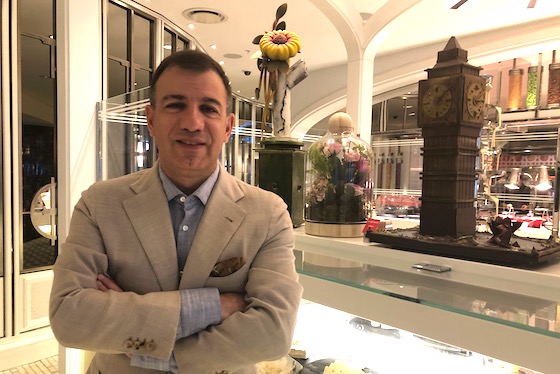GOSTELOW REPORT—”Burj Al Arab has been the icon not only of its operator, Jumeirah, but of Dubai since it opened in 1999. But it has never been recognized as a culinary destination,” says the hotel’s managing director, Anthony Costa, who is also regional vice president for Jumeirah Hotels & Resorts.
The unique 28-floor, sail-shaped hotel, which has 202 keys, all suites, now needs to be known for its food. On April, three new top talents started work, each heading one of the hotel’s nine outlets. Kasper Kurdahl, from Chateau Foret in Belgium, assumed control of the 100-seat Al Mahara; Kim Joinie Maurin, formerly executive chef of Robuchon in Singapore, took over the 60-seat Skyview, and Francky Semblat, another Robuchon veteran who had moved around his global empire for 18 years, inherited leadership of Al Muntaha, which has 80 seats.

The three were chosen after prolonged consultation between Costa – who was renowned, when working in Tokyo, for persuading René Redzepi temporarily to relocate Noma to Japan – and two other foodies. Costa was joined in the selection process by Jumeirah Group CEO José Silva, a self-confessed and generally renowned gourmet, and Chief Culinary Officer Michael Ellis, who after heading Michelin’s motorcycle sales had a seven-year stint directing its restaurant and hotel guides.
“We three all wanted the chosen talent to have had Michelin environments for a certain length of time. They needed to be in-house, producing food that customers actually want – 80% of our restaurants’ business is from outside,” Costa explained.
The chefs were hired direct, not via agents (Costa had wanted a female but has not been able to find one at this stage – he does already have a local Emirati woman in his main pastry kitchen). The chosen three were invited to Dubai. They came, they looked and they agreed to be part of the hotel’s team, each bringing one assistant. There is no pecking or even alphabetical order: “I must be careful not to give too much publicity to any one of them,” admitted Costa.
Each chef is empowered, reporting direct to Costa, who does not have an executive chef. “I have chefs in all outlets, and they are responsible for their own operations,” he explained. The three can also call on support from Michael Ellis, who joins in food tastings.
Why bring them on simultaneously? “With three chefs at the same culinary level, all starting at on the same day, they could immediately work to a shared philosophy,” explained the MD.
And what, after three weeks, is the result? The obvious outsiders’ expectation – that food costs would soar – seems to be unfounded. “Al Mahara, Al Muntaha and Skyview have always been working with premium products, so I don’t see food costs increasing – if they do go up, it will be marginally.”
There will undoubtedly be additional spend. Will the chefs want more help in their kitchens? Will they ask for extra servers, and perhaps restaurant renovations? Costa says firmly that the names and looks of the restaurants will not change but there will be new tabletop, a review that will be phased in over the next six months. He expects some of the items to be bespoke or custom-made for each chef. At the moment, although menus have already evolved, prices have not been increased. Interestingly, too, the chefs’ names are not apparent – yet (remember that their contracts were not via agents).
“Looking back, I can already see that food standards are improving. These chefs are all very talented. Yes, the chefs that we had previously were talented, too. The difference is that now our leaders are really educating their respective brigades on their techniques, taste, product to ensure that all are on the same page. Every week each chef presents dishes for review and those selected are indeed memorable – Kasper Kurdahl’s wild turbot with truffle cream and parsley is just one example. The overall goal is consistency. I am also looking for at least 10% increase in customer spend.”
The marketing follow-up will undoubtedly help the overall return on investment in the new-look food at Burj Al Arab. One of the judges for the 2018 HOTELS Great Hotel Restaurants, who wishes to remain anonymous, says that with Michelin-level chefs, an additional 5% of sales is generally required for marketing and PR.
Costa sees considerable benefits in promoting his food at events. “I want to give them exposure, particularly in the USA, the U.K., Moscow and Hong Kong,” he said.
